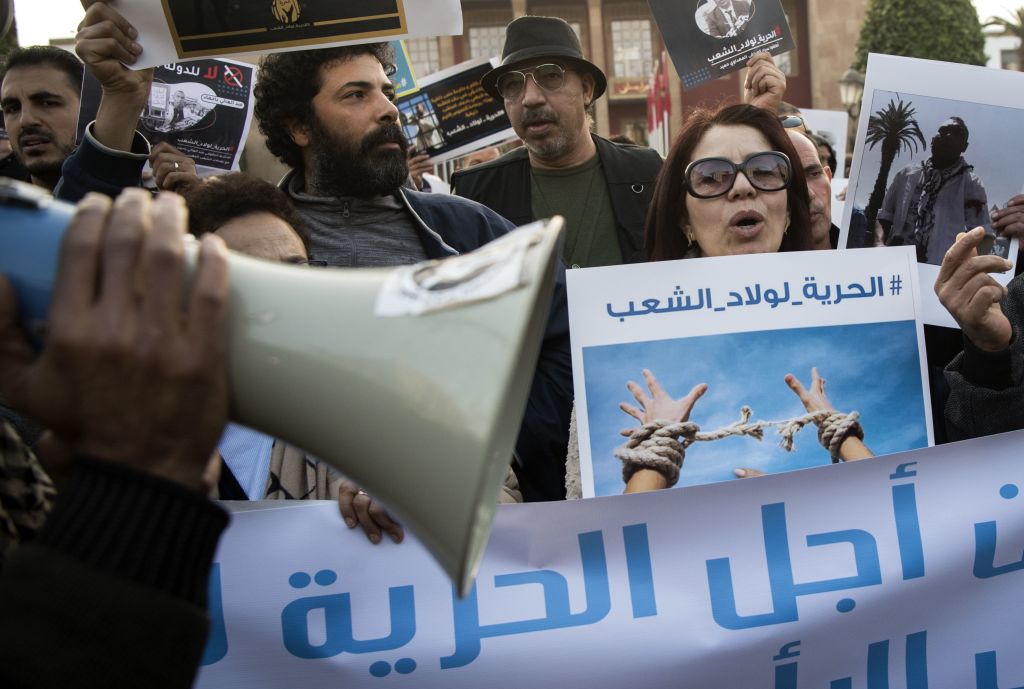The Moroccan authorities must urgently and unconditionally release all those imprisoned solely for peacefully protesting or expressing their views including dozens of Hirak El-Rif protesters, rappers, bloggers and journalists, Amnesty International said today amid growing concerns over the spread of COVID-19 in prisons.
The Moroccan authorities should be prompted by the grim prospect of COVID-19 spreading in prisons to release the dozens of detainees held simply for expressing their views or for exercising their right to protest. These peaceful individuals should never have been imprisoned in the first place
Heba Morayef
In addition, those with underlying medical conditions and older prisoners should be immediately considered for alternatives to detention if they do not pose a threat to themselves or society, and there should be a presumption of release for people charged with a crime and awaiting trial.
“The Moroccan authorities should be prompted by the grim prospect of COVID-19 spreading in prisons to release the dozens of detainees held simply for expressing their views or for exercising their right to protest. These peaceful individuals should never have been imprisoned in the first place.” said Heba Morayef, Amnesty International’s MENA Regional Director.
“For those who remain in detention or prison the Moroccan government must provide a standard of health that meets each person’s individual needs and ensures the maximum possible protection against the spread of COVID-19.”
The Moroccan authorities have over the past six months increased their intolerance towards those daring to express their views freely. Between November 2019 and January 2020 alone, at least ten individuals including one journalist and two rappers were arrested and sentenced to prison sentences in relation to their legitimate exercise of their right to freedom of expression online. All of them were accused of “offending public officials or institutions, and seven of the group are currently imprisoned in various locations across Morocco.
For example, activist Abdelali Bahmad, alias Ghassan Bouda is serving a one-year prison sentence for “insulting” the Monarchy after he wrote online posts in support to the Hirak El-Rif protests on his page. Bloggers Moul El Hanout and Youssef Moujahid are serving four years in prison after a Rabat court convicted them of offending “public officials” and “institutions” and “incitement to hatred” for posting videos in which they legitimately exercise their right to freedom of expression online.
For those who remain in detention or prison the Moroccan government must provide a standard of health that meets each person's individual needs and ensures the maximum possible protection against the spread of COVID-19
Heba Morayef
According to the Moroccan Association for Human Rights (AMDH), as of March 2020, the number of prisoners detained for legitimately expressing their views across the country reached 110.
Prisons in Morocco suffer from over-crowding and a significant proportion of the prison population are pre-trial detainees. In November 2019, Mustapha Ramid, the minister in charge of human rights and relations with the Parliament informed members of the upper house of the Moroccan Parliament that prison overcrowding was around 138% with 83,747 detained in 2018. According to the Minister of Justice, in 2018, 40 percent of the total prison population was held in pre-trial detention.
“The government should also seriously consider adopting non-custodial measures for people accused of minor offenses or who are particularly vulnerable to COVID-19, such as older prisoners and those with serious medical conditions.” Said Morayef.
A number of prisoners have over the past years gone on hunger strikes to call for access to better health care or visitation rights. These include many of the Hirak al-Rif prisoners sentenced by a Casablanca court to lengthy prison sentences for taking part in the social justice movement in Morocco’s northern Rif region throughout 2017. Amnesty International called the trial a miscarriage of justice since the court relied on confessions obtained under torture to convict the 43 men who participated in the protests.
The government should also seriously consider adopting non-custodial measures for people accused of minor offenses or who are particularly vulnerable to COVID-19, such as older prisoners and those with serious medical conditions
Heba Morayef
Protests leaders Nabil Ahamjik and Nasser Zefzafi started a hunger strike on 22 February demanding access to health care and visit rights. Both had to end their hunger strike over fears of COVID-19 spread on 17 March.
Background
According to the Ministry of Health, as of 6 April, the total number of Covid-19 confirmed cases in Morocco/Western Sahara amounts to 1021, 70 people died from coronavirus complications, while 76 others have recovered. On 16 March, Moroccan judicial authorities announced the suspension of court hearings until further notice except for those relating to cases of detainees, cases in summary proceedings and cases currently under investigation.
On 5 April, King Mohammed VI has granted his pardon to 5,654 detainees and gave orders to take all the necessary measures to strengthen the protection of detainees in prisons, particularly against the spread of the coronavirus epidemic, the ministry of justice announced on Sunday.
On 20 March, the Ministry of Interior announced the total confinement of the population until 20 April. On 23 March, Parliament passedlaw n°2.20.292 organizing the public health emergency law and imposing prison sentences of between one and three months for anyone defying the state of emergency.
The secretary general of the presidency of the public prosecutor’s office, reported on 28 March, that the police had arrested 450 individuals for breaking the public health emergency law and 56 for publishing false information on COVID-19.
COVID-19 AND HUMAN RIGHTS
Stay Informed, Get Inspired, Take Action


